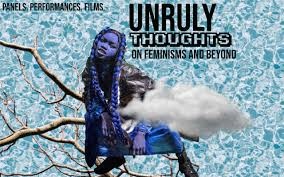
The maiden edition of the Unruly Thoughts Feminist Festival 2022, presented three dynamic, women led experimental films Tezen (Dir: Shirley Bruno), Seeking Aline (Dir: Rokhaya Marieme Balde) and Aurora (Dir: Everlane Morales). In these short films, primarily directed by women of African descent, viewers were exposed to moments of beauty, truth and strength; peppered with an interrogation of feminine power.
The stories, all of which revolve around a female-centric point of enquiry, are refreshing and empowering to see on screen. Female agency presents itself across each of the narratives, with protagonists who are relatable in their ordinariness and absent of subjectification to the male gaze.
Where water and folklore act as consistent themes in Tezen and Seeking Aline, with our protagonists drawing from their relationship with the earth to empower themselves, family members and their community; Aurora by contrast offers a provocative, internalized realisation of what it means to be a woman.
 In Tezen, we are introduced to a restless young woman who upon encountering a water spirit discovers a new lease of life. This title is one of a rapidly evolving canon of water spirit narratives from filmmakers of African descent across the diaspora. Over the last year the emergence of films such as Nikyatu Jusu’s Nanny (2022) and CJ Obasi’s Mami Wata (2023) have suggested as resurgence of interest in folklore related to the feminine water Goddess.
In Tezen, we are introduced to a restless young woman who upon encountering a water spirit discovers a new lease of life. This title is one of a rapidly evolving canon of water spirit narratives from filmmakers of African descent across the diaspora. Over the last year the emergence of films such as Nikyatu Jusu’s Nanny (2022) and CJ Obasi’s Mami Wata (2023) have suggested as resurgence of interest in folklore related to the feminine water Goddess.
In the African diaspora, the water spirit Mami Wata is regarded as a beautiful, protective and at times dangerous underwater deity. She is celebrated in folklore, as a figure who straddles earth and water, culture and nature much as the young female protagonist we follow in Tezen.
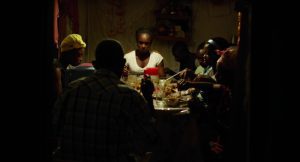
© Tezen by Shirley Bruno (France/Haiti, 2016, 28min)
The Smithsonian National Museum of African Art describes the water spirit affectionately referred to by some as Mami Wata as a ‘complex symbol with so many resonances … she is at once a nurturing mother; sexy mama; provider of riches; healer of physical and spiritual ills; and embodiment of dangers and desires, risks and challenges, dreams and aspirations, fears and forebodings. People are attracted to the seemingly endless possibilities she represents’. The attraction of the water spirit is fully evidenced in Tezen where ultimately, she entices our female adolescent to leave the solid form of earth for uncertain watery depths.
Tezen starts off as a seemingly mundane, poetic narrative about a young woman’s daily burden to fetch water for her family. Intimacy is set as we watch our protagonist collect water by the stream in an undisclosed part of the Caribbean Island of Haiti. We see her carefully scoup water into a bucket that serves her family’s domestic needs. This act of water fetching and bucket use become a touching storytelling device throughout the piece.
As the film progresses, we observe an absorbing inter- generational family scene, where members crowd over a table, stuffing hungry faces. In perfect symmetry they drink glasses of water. The clatter of utensils and conversations being held over full mouths creates a perfect orchestra of sound and performance.
Thoughtful scenes show our protagonist in repose as she completes her daily ritual of fetching water. Snapshots of lush landscape appear throughout the film, serving as vivid provocations about the fertility of the land and her connection to it as she walks comfortably over the terrain from home to the stream and back.
She is contemplative and effectively silent throughout the piece. On the rare occasion where we do hear an utterance from her, it is to summon the elusive water spirit at the stream. Eventually she is seduced by the unseen spirit, seeking her destiny in the water through full submersion.
Entering the water and being in full communion with mother water appears to free our adolescent protagonist from the burden of having to take from the water; instead, she can be whole with the water. It is in this context that the folklore around Mami Water’s role as a protector of children is especially poignant and better understood. Our protagonist has no fear as she slides into the slippery depths of the stream, she is free in reverence of the feminine water Goddess.
Seeking Aline offers a re-enactment of the true-life story of the Senegalese heroine Aline Sitoe Diatta. Born in 1920, Aline was said to have worked in such unison with her community and the earth in defiance of the colonial authorities that her story has become part of West African folklore.
The film opens with a scene of our protagonist Aline in a dream state spiritual encounter by the sea. Three masculine figures inform her of an act she must carry out to which she is initially resistant. We later learn that this is to rise up against French colonialists.
Aline, rumoured to have had supernatural powers, was said to have had the ability to bring rain to dry land. Seeking Aline probes the character behind the folklore giving a visceral interpretation of who she was.
 In another scene, a male elder appeals to the spirit of Aline by a small lake. He summons her energies based on rumours of her kindness. In another scene we see a re-enactment of one of her now legendary rain rituals. Here the Aline of folklore enters the screen in her power with the relationship between the feminine and water in full evidence. The rain ceremony is successful with Aline effectively summoning water from the skies to nourish her community’s drought ridden land.
In another scene, a male elder appeals to the spirit of Aline by a small lake. He summons her energies based on rumours of her kindness. In another scene we see a re-enactment of one of her now legendary rain rituals. Here the Aline of folklore enters the screen in her power with the relationship between the feminine and water in full evidence. The rain ceremony is successful with Aline effectively summoning water from the skies to nourish her community’s drought ridden land.
In Seeking Aline we see the presentation of a woman who not only knew how to work with the elements, but who also was not afraid to fight for what she believed in. Historical records refer to her resistance alongside other market women against the French when they seized half of the region’s rice harvest to support Europe’s Second World War effort.
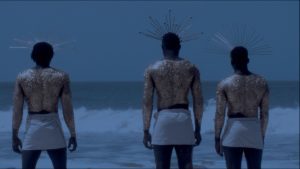
© À la recherche d’Aline | Searching Aline by Rokhaya Marieme Balde (Switzerland/Senegal, 2020, 27’) | HEAD Genève – Cinema
Aline went further in encouraging her community to cease paying taxes and to refuse cooperation with the French. She also is said to have called for the reinstatement of better working conditions and rights to indigenous religious worship.
What makes Seeking Aline’s retelling of this brave woman’s life so compelling is the fact that it highlights that Aline could see which the white colonialist could not; man induced water shortages that would extend far into the future. It is telling that her contemporaries recount what were her ‘penetrating eyes’ and the ‘strong gaze’. Ironically, at the time of writing this piece, UNESCO and UN Water released the latest edition of the UN World Water Development Report which warns of the imminent risk of a global water crisis for between two and three billion people worldwide … posing severe risks to livelihoods, notably through food security.
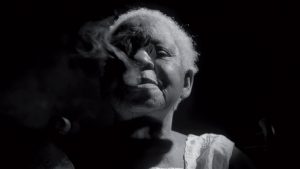 Sadly, in 1943, the French authorities caught up with and arrested the headstrong Aline, sending her in exile to jail in Timbuktu where she unfortunately died a year later. Her spirit however lives on as a result of miracle making leadership and heroic acts that characterised her life and have entered folklore, still spoken of down the generations. Seeking Aline serves to further enshrine her memory.
Sadly, in 1943, the French authorities caught up with and arrested the headstrong Aline, sending her in exile to jail in Timbuktu where she unfortunately died a year later. Her spirit however lives on as a result of miracle making leadership and heroic acts that characterised her life and have entered folklore, still spoken of down the generations. Seeking Aline serves to further enshrine her memory.
Whilst absent of a folkloric reference point, Aurora offers of glimpse of the sides of the feminine that is arguably the stuff of folklore. In closed off spaces, three black women of different ages, relive and reinterpret personal testimony using inner monologues and memories. These women offer private expressions that remain unspoken by the protagonists of Tezen and Seeking Aline forcing the viewer to contemplate their motivations. It is perhaps for this reason that Aurora is the most complex of the trio of films.
In silence, a teenage woman, pads out her bra in front of the mirror in her room; a woman of maturity touches herself and experiences some sort of ecstasy; a female elder with amputated legs gets up for the start of her day combs her ivory hair. At some point all women face themselves in front of a mirror; their expressions raising more questions than answers.
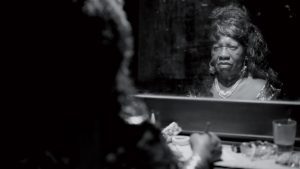
© Aurora by Everlane Morales (Cuba, 2019, 15min)
The perspective of viewer offers up something illicit, observing these quiet moments where we witness the emotions of these ladies, ranging from anxiety, sorrow and sadness. Though there is no dialogue, it is evident that our characters are expressing the blues. In the absence of a narration of their stories, space is created for we the audience to contemplate and interpret our own feminine centred lore.
In their enriching forms, Tezen, Seeking Aline and Aurora unwittingly provoke reflection about the interconnectedness of the feminine earth, nature and spirit; and ultimately suggest folklore as a basis of strength for feminists of the modern day.
Sign up and stay informed of my forthcoming events.